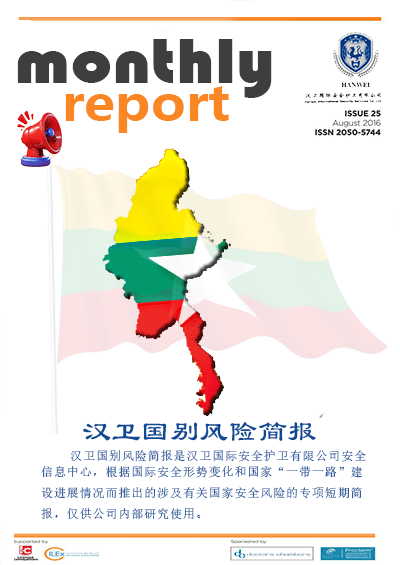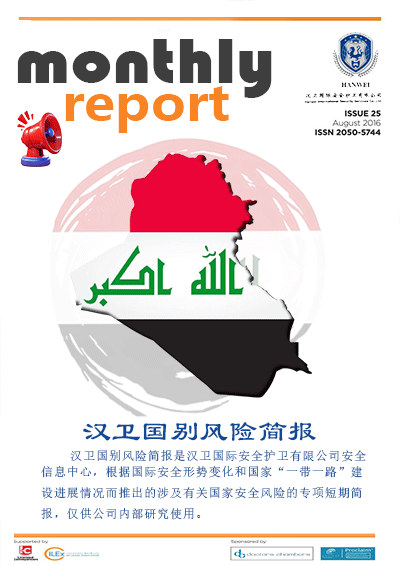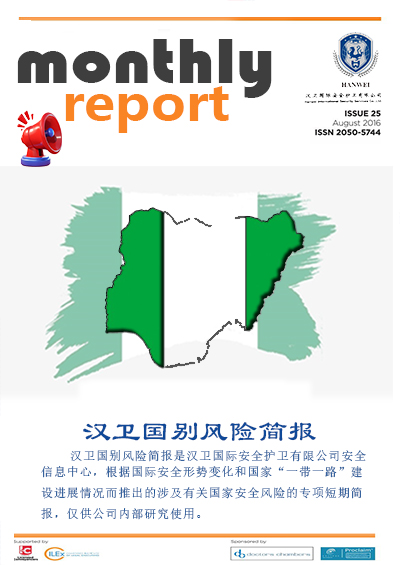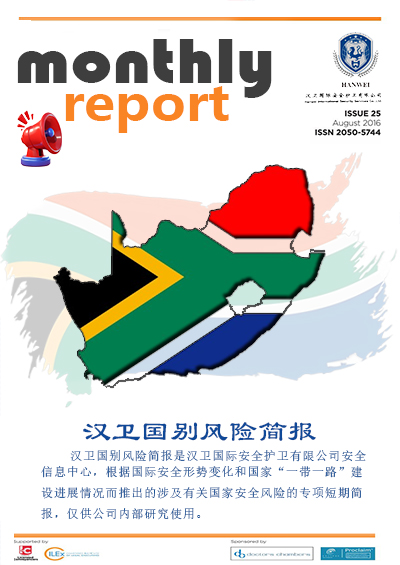Nigeria Social Security Situation Analysis - October 2024
Researcher No. 007
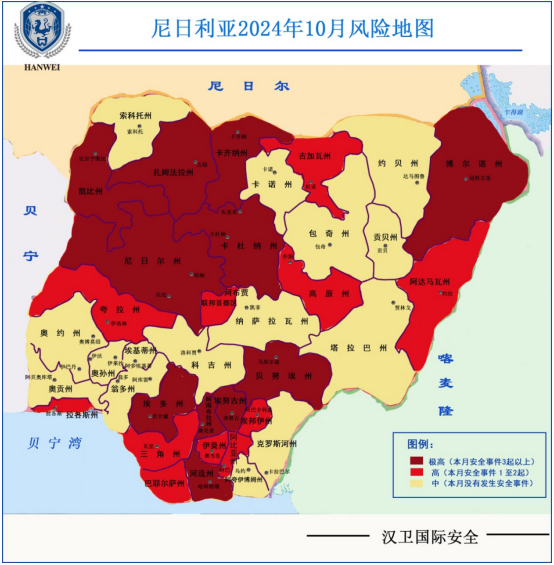
According to monitoring reports from Hanwei International's West Africa security officers and comprehensive media coverage, Nigeria recorded 59 security incidents in October 2024. These incidents resulted in 331 civilian deaths, 19 security personnel fatalities, and at least 80 kidnappings. The main types of incidents included armed attacks, kidnappings, protests, and public safety accidents. Compared to September, security incidents increased by 8, deaths rose by 120, while kidnappings decreased by 28. Analysis indicates Nigeria's security situation deteriorated this month, with persistent armed attacks/kidnappings, renewed mass protests/riots, and public safety incidents (floods, accidents, disease outbreaks) causing significant casualties and property damage. North-central, central-west and central-south regions face extreme risks, while other areas remain high or medium-high risk.
I. Comprehensive Security Incident Analysis
The 59 October incidents comprised: 25 armed attacks (49%), 18 kidnappings (30%), 5 public safety accidents (8%), 6 protests (10%), 1 herder-farmer conflict (1.6%), and 4 military operations (6.7%). Total casualties reached 655 deaths (331 civilians, 19 security personnel, 305 terrorists killed) with 80 kidnappings.
Key characteristics:
(1) Extreme Risks in North-Central and Central-SouthIncidents concentrated in Katsina, Kaduna, Zamfara, Niger (north-central) and Rivers, Anambra, Benue (central-south). Rivers and Anambra saw 6 incidents each (14/28 deaths respectively). Kaduna/Zamfara recorded 5 incidents each (2/10 deaths, 13 kidnappings). Borno's 3 attacks (up 2 from September) left 18 dead and 15 kidnapped. Notably, Boko Haram's October 1 Independence Day attack killed 11 farmers and abducted 15. Kano city entered "high alert" on October 10 as bandits retreated from military operations in Zamfara/Sokoto. Chinese entities should enhance precautions.
Figure 1: October Security Incident Distribution
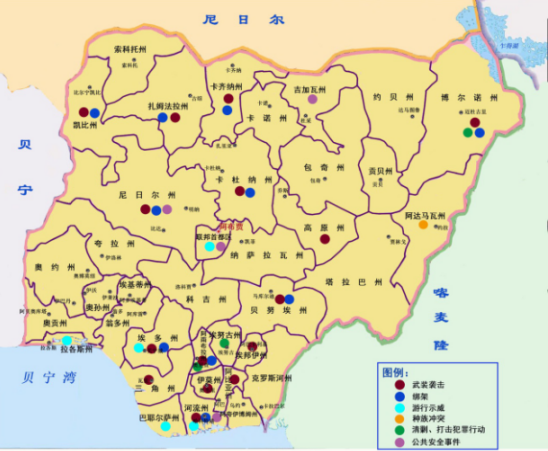
Chart 1: Major Regional Incident Statistics
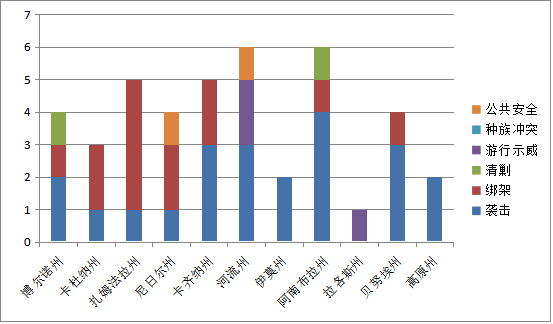
(2) Persistent Armed Attacks/Kidnappings
25 attacks and 18 kidnappings caused 132 deaths and 80 abductions.
Key incidents: October 1 - Fulani herders killed 6 in Benue; October 4-10 - Boko Haram attacks in Borno (11 dead, 15 kidnapped); October 7-9 - Bandit raids in Katsina (11 dead); October 10 - Mining site attack in Plateau (4 dead); October 17 - Quarry attack in Edo (1 police killed); October 28 - Road ambush in Abia (3 drivers killed); October 31 - Niger highway kidnapping (20 abducted).
West Africa now accounts for over 50% of global terrorism deaths. ECOWAS Chair noted the Sahel has replaced the Middle East as terrorism's epicenter. Nigeria ranks 8th globally in terrorism impact, with 238 attacks (905 deaths) in 2023.
(3) Renewed Mass Protests Turn Violent
On October 1 (Independence Day), "October Fearless" protests against economic hardship erupted in Abuja/Lagos despite government warnings. Police used tear gas, while Port Harcourt saw journalists assaulted and government buildings occupied.
Post-election protests in Rivers/Plateau on October 5/9 turned deadly (10+ killed). Rivers saw armed vote-blocking, while Plateau protesters alleged fraud. On October 7, supporters of FCT Minister Wike burned three LG secretariats in Rivers (5 dead).
(4) Major Public Safety Disasters
October recorded 1 boat accident, 1 tanker explosion, 1 plane crash and 1 building collapse (217 deaths total). Boat accidents have killed 1,429 since 2020 (400+ in 2024 alone), mainly due to aging vessels/night travel. Floods affected 34 states (217 LGAs), displacing 740,000+ people, killing 321, and destroying 280,000 homes.
Disease outbreaks escalated: Cholera (10,837 suspected/359 dead); Lassa fever (8,569 suspected/1,035 confirmed/174 dead, 16.8% CFR); Monkeypox (1,395 suspected/108 confirmed, 0 deaths).
Nationwide blackouts occurred after the national grid collapsed on October 15. Transmission tower sabotage on October 19 cut power to Kano/Kaduna, crippling healthcare/water services.
(5) Military Operations Neutralize 305 Militants. October counterterrorism raids in northeast/central-south freed 264 hostages. On October 10, forces killed 165 bandits (238 arrested, 188 rescued, 153 weapons seized). October 25 strikes eliminated 140 terrorists (135 arrested, 76 rescued).
Chart 2: October Incident Type Comparison
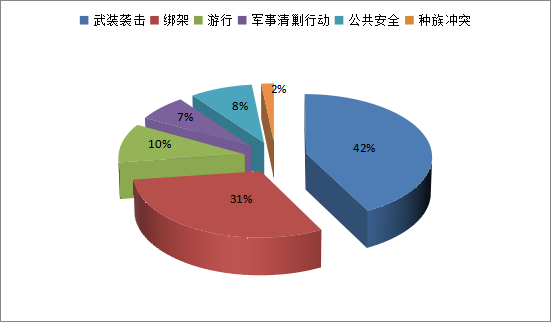
Chart 3: October Death Toll Breakdown
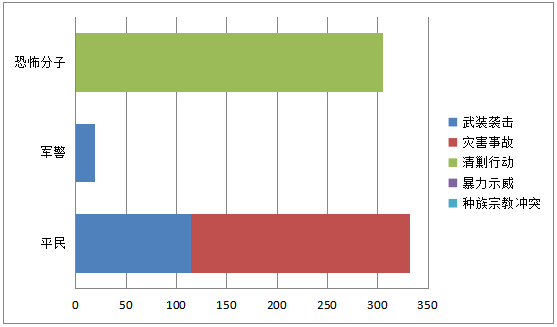
Chart 4: October vs September Incident Comparison
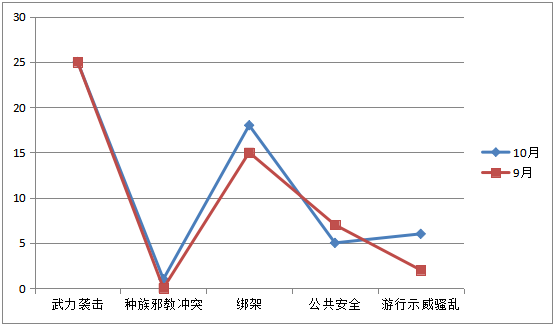
II. Risk Warnings & Prevention Measures
Chart 5: Nigeria Social Security Risk Alert
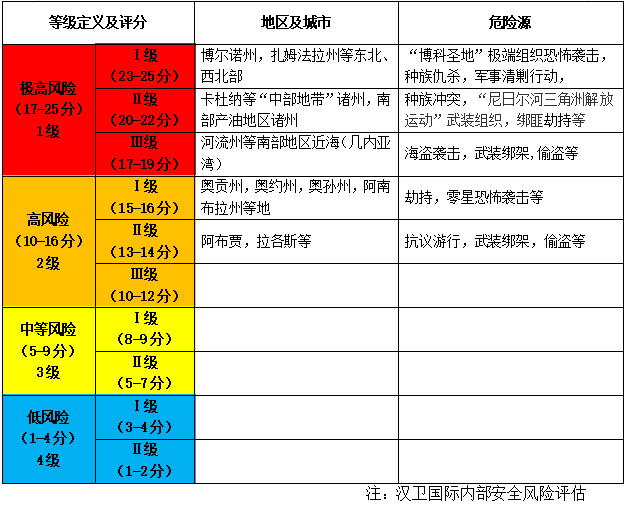
Given Nigeria's complex security environment, we recommend:
1. 24/7 Armed Escorts for Travel Rural areas lack police presence and have poor infrastructure, causing delayed emergency responses. Chinese entities should obtain real-time security updates, conduct route assessments, and use professional protection.
2. Maintain Flood Prevention Vigilance Following the release of water from Cameroon's Lagdo Dam on October 22, 2024, at least 25 communities along the Niger River in Edo State were flooded, causing the collapse of the Ore Bridge on the Ijebu Ode-Benin Expressway (near 6°45'40.6"N 4°07'22.5"E). Currently, water levels continue to rise in Bayelsa, Rivers, Ondo and other states. Chinese enterprises and individuals in affected areas should closely monitor flood alerts, exercise caution when traveling, and implement appropriate response measures.
3. Ensure Legal Compliance in Operations October saw another case of Chinese nationals arrested for illegal mining. On October 29, Nigeria's Ministry of Solid Minerals Development announced the arrest of three Chinese citizens and two Nigerians at an illegal mining site in Kokona LGA of Nasarawa State. This operation was part of intensified government crackdowns on illegal mining. The suspects were allegedly extracting fluorite, zinc, lead and tin illegally. The Nigerian government has established a 2,570-member mining police force under the Nigeria Security and Civil Defence Corps (NSCDC), which has arrested over 200 individuals and prosecuted approximately 140 to date. Chinese enterprises and citizens in Nigeria must prioritize legal operations, comply with Nigerian laws and regulations, and avoid involvement in similar legal disputes or criminal cases.
4. Implement Effective Risk Avoidance Measures Most attacks in Nigeria occur in the northeast and north-central regions, particularly Maiduguri in Borno State, roads connecting major towns, border areas with Niger Republic, and Zamfara State. Kaduna State and Abuja have also experienced frequent security incidents recently. In the event of terrorist attacks, follow official instructions and immediately contact designated security providers for assistance. Install surveillance systems at residences, shops and warehouses; establish defensive perimeters with trenches, high walls, barbed wire, crash barriers, buffer zones and alarm systems; and enhance military/police security presence. Avoid lingering near potential attack targets including government/military facilities, landmarks and religious sites. Minimize time spent in high-risk public areas such as northeast Nigeria, religious festival venues, ethnically mixed communities, high-crime zones (especially highways and Gulf of Guinea piracy hotspots), oil/gas facilities, government/military installations, diplomatic compounds, places of worship, schools, markets, refugee camps and transportation hubs.

